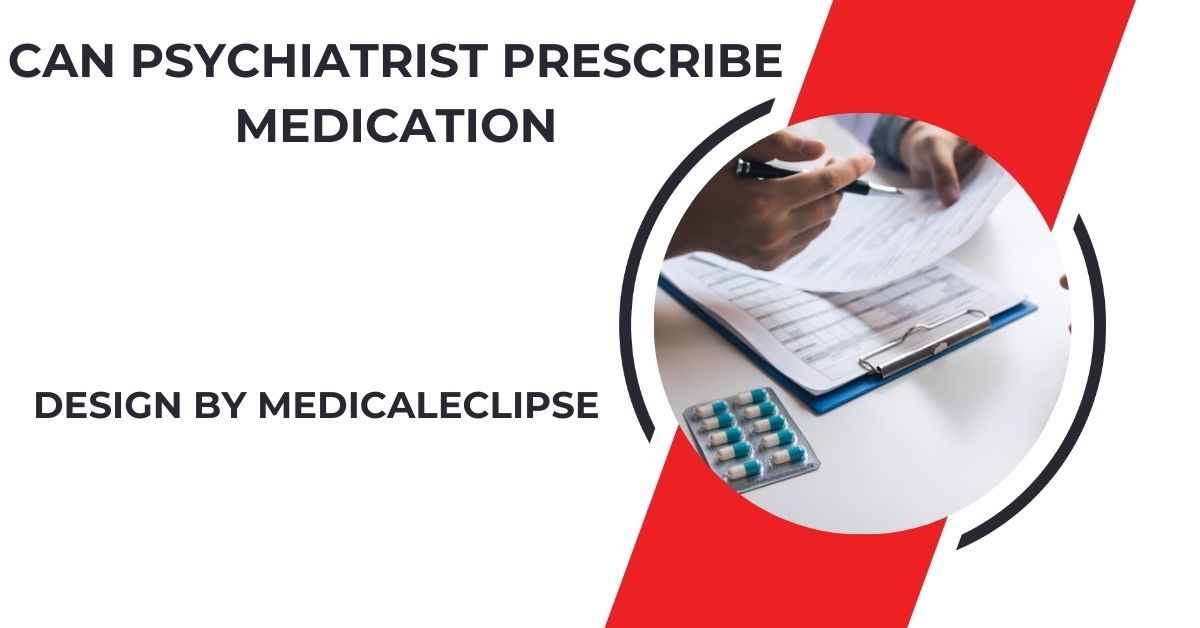Yes, psychiatrists can prescribe medication as they are licensed medical doctors with the training and authority to evaluate mental health conditions and determine appropriate treatments.
In this article, we’ll explore the qualifications of psychiatrists, the types of medications they can prescribe, and the overall process of receiving medication for mental health conditions.
What is a Psychiatrist?

A psychiatrist is a medical doctor (MD or DO) who specializes in diagnosing, treating, and preventing mental health disorders. Their training and expertise distinguish them from other mental health professionals. Psychiatrists have a deep understanding of the biological, psychological, and social components of mental health, enabling them to provide comprehensive care.
Education and Training:
To become a psychiatrist, one must complete extensive education and training:
- Bachelor’s Degree: The journey typically begins with a four-year undergraduate degree, often with a focus in psychology, biology, or a related field.
- Medical School: After earning a bachelor’s degree, prospective psychiatrists attend medical school for another four years. Here, they gain a solid foundation in medical knowledge, including anatomy, pharmacology, and the fundamentals of patient care.
- Residency Training: Following medical school, psychiatrists must complete a residency program in psychiatry, which lasts about four years. During this period, they receive hands-on training in various settings, including hospitals and outpatient clinics, and learn to diagnose and treat a wide range of mental health disorders.
- Board Certification: After completing residency, psychiatrists may choose to become board-certified by passing an examination administered by the American Board of Psychiatry and Neurology (ABPN). This certification demonstrates their expertise and commitment to the field.
Can Psychiatrists Prescribe Medication?
Yes, psychiatrists can prescribe medication. As licensed medical doctors, they possess the necessary qualifications and legal authority to evaluate mental health conditions and determine whether medication is an appropriate treatment option. Their medical background allows them to understand the physiological effects of medications and how they interact with various mental health conditions.
Also Read: A Office Manager is Making Decisions About My Medical Issues – Steps to Take!
Types of Medications Psychiatrists Can Prescribe:
Psychiatrists can prescribe a wide range of medications tailored to treat various mental health disorders, including:
Antidepressants:
These medications are commonly prescribed for conditions such as depression and anxiety disorders. Common classes of antidepressants include:
- Selective Serotonin Reuptake Inhibitors (SSRIs): Such as fluoxetine (Prozac) and sertraline (Zoloft), which help increase serotonin levels in the brain.
- Serotonin-Norepinephrine Reuptake Inhibitors (SNRIs): Such as venlafaxine (Effexor) and duloxetine (Cymbalta), which affect both serotonin and norepinephrine.
Antipsychotics:
Used primarily to manage symptoms of psychosis, such as hallucinations and delusions, these medications can also be effective for mood disorders. Examples include:
- First-Generation Antipsychotics: Such as haloperidol (Haldol).
- Second-Generation Antipsychotics: Such as risperidone (Risperdal) and aripiprazole (Abilify).
Mood Stabilizers:
Mood stabilizers are essential for individuals with bipolar disorder as they help control mood swings and maintain emotional stability. They are particularly effective in preventing both manic and depressive episodes. Common examples of mood stabilizers include lithium and lamotrigine (Lamictal), which work by balancing chemicals in the brain to stabilize mood.
Anxiolytics:
Medications such as benzodiazepines (e.g., diazepam/Valium, lorazepam/Ativan) can be prescribed to alleviate anxiety symptoms. However, these are typically used for short-term management due to the potential for dependence.
Stimulants:
Stimulants are often prescribed for attention-deficit hyperactivity disorder (ADHD) to improve focus and concentration. Medications like methylphenidate (Ritalin) and amphetamine (Adderall) work by increasing the levels of certain neurotransmitters in the brain, enhancing attention and reducing impulsivity. They can be highly effective in helping individuals manage ADHD symptoms.
The Process of Medication Management:

When you visit a psychiatrist for mental health concerns, the process of medication management typically involves several important steps:
- Initial Evaluation: The psychiatrist conducts a comprehensive assessment that includes a detailed medical history, a review of your symptoms, and any previous treatments you’ve tried. This information helps the psychiatrist understand your unique situation and make informed decisions regarding your care.
- Diagnosis: Based on the evaluation, the psychiatrist will provide a diagnosis. This diagnosis is critical as it guides their treatment recommendations, which may include medication, therapy, or a combination of both.
- Treatment Plan: If medication is deemed appropriate, the psychiatrist will develop a tailored treatment plan. They will discuss the potential benefits and risks of the prescribed medication, ensuring you understand how it fits into your overall treatment strategy.
- Monitoring and Follow-Up: After starting medication, regular follow-up appointments are essential to monitor your response and make necessary adjustments. This ongoing evaluation ensures that the treatment remains effective and addresses any side effects or concerns you may have.
- Coordination of Care: Psychiatrists often collaborate with other healthcare providers, such as therapists or primary care physicians, to ensure a holistic approach to your mental health care. This collaboration can enhance your treatment experience and provide additional support.
Collaborating with Other Mental Health Professionals:
While psychiatrists can prescribe medication, they often work closely with other mental health professionals, such as psychologists, social workers, and therapists. This collaborative approach allows for a comprehensive treatment plan that may include:
- Psychotherapy: Many psychiatrists recommend therapy as a complementary treatment to medication. Therapeutic approaches, such as cognitive-behavioral therapy (CBT) or dialectical behavior therapy (DBT), can help address the underlying issues contributing to mental health conditions.
- Support Services: Psychiatrists may connect patients with support services, such as group therapy or community resources, to enhance their treatment experience and foster a supportive environment.
FAQs
1.Can psychiatrists prescribe medication?
Yes, psychiatrists can prescribe medication as they are licensed medical doctors trained to evaluate and treat mental health conditions.
2.What qualifications do psychiatrists have?
Psychiatrists have a medical degree, complete residency training in psychiatry, and may obtain board certification in their field.
3.What types of medications can psychiatrists prescribe?
They can prescribe antidepressants, antipsychotics, mood stabilizers, anxiolytics, and stimulants, depending on the patient’s needs.
4.What is the medication management process?
The process involves an initial evaluation, diagnosis, creating a treatment plan, monitoring progress, and follow-up appointments.
5.Do psychiatrists work with other mental health professionals?
Yes, psychiatrists often collaborate with therapists and social workers to create a comprehensive treatment plan for their patients.
Conclusion
In summary, psychiatrists can prescribe medication to manage mental health disorders. Their medical training enables them to evaluate symptoms and develop comprehensive treatment plans, including therapy and medication. Consulting a psychiatrist can be a vital step toward recovery. Open communication about treatment preferences is essential for effective care and can empower your journey to mental health recovery.

Leave a Reply